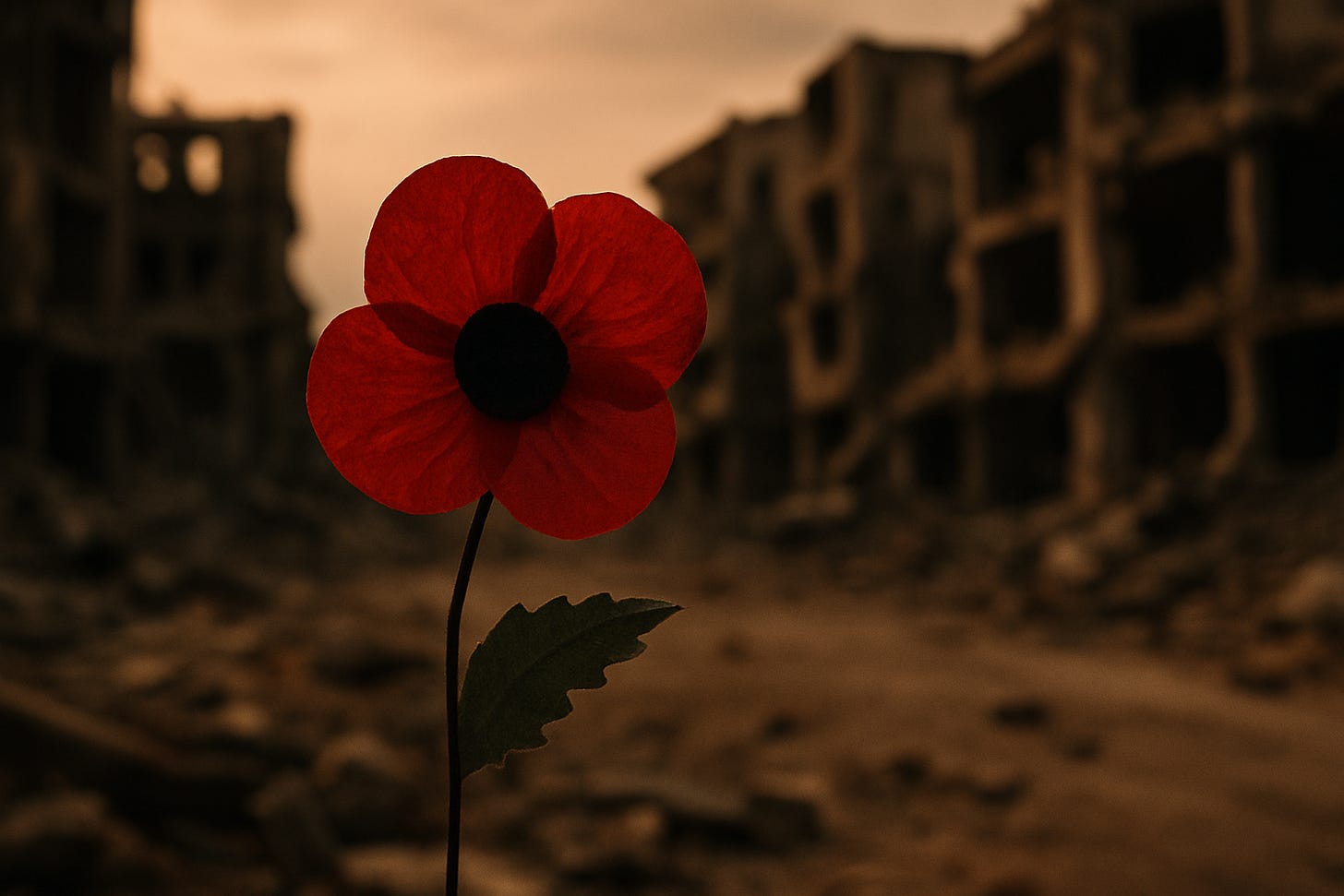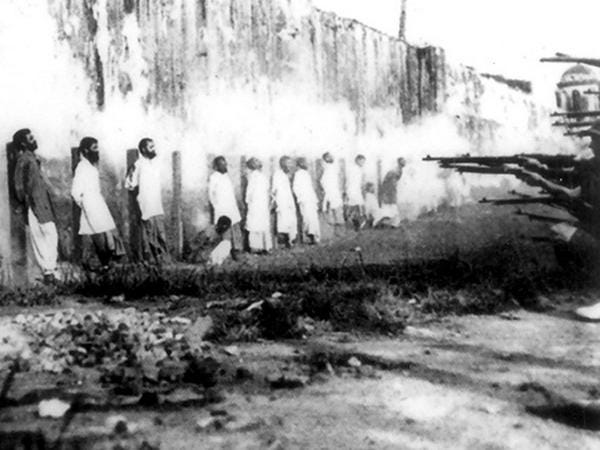Remembrance at the Time of Genocide: A Muslim Perspective
Remembrance has become ritual, while the lessons lie buried with the dead
When I was in High School, I once drew a Swastika. Yes, that’s right, a young Muslim boy drawing a Swastika. It was in History class, the teacher ‘flipped’; she told me that “Hitler had also killed Muslims”. I sat there and thought for a minute that she (the teacher) had failed to mention that in class, how very odd.
In my defence - despite at that moment being a suspected Nazi sympathiser I thought I’d get a defence - I was simply attempting to copy the cover of a book which depicted the Swastika burning, my intention was to copy the cover for the cover of my work. Alas, my defence fell on deaf ears and I think (although I can’t be sure) the whole class was reminded about my indiscretion. It was like the Nuremberg Trials, with the teacher being judge, jury and executioner.
As Remembrance Day comes about, what struck me about SwastikaGate was the teacher’s need to remind me that Hitler had killed Muslims, as if I, as a young boy, could only understand the horrors of Hitler’s Third Reich through the prism of Muslim death and not death per se. That was the 1980s, yet the clear divide of ‘us’ and ‘you lot’ was still there, decades before 9/11, the migrant crisis and British Islam, Muslims were otherised.
There is now such an aura around Remembrance that any form of critique not for those who died but for the policies and political objectives they died for, is seen as taboo.
Poppy wearing has become as one article in The Independent labelled it “performative” . An act more done for show, than one of true remembrance, those willing to shout you down for not wearing a Poppy are mainly those that also want to ‘Stop the Boats’.
A symbol politicised to separate policy from the soldiers, the orders from those that carry them out, the simple act of wearing one proves your Britishness and right to belong to society on the cusp of tearing itself apart.
Such is the mania around the wearing of the Poppy, there is no room for debate, dialogue and discourse, the very things British soldiers from World War One to Afghanistan to Iraq have been told they are dying for.
The Poppy has always been a divisive subject for Muslims. Growing up, I am sure I bought and wore the odd Poppy or two around Remembrance Day. My parents had very little idea what it stood for, and I thought I was doing something charitable by donating some money.
Many decades later (circa 2014) my eldest son was given homework on the subject of Remembrance Day. Usually, I would have asked him to think about the victims of recent wars, Iraq and Afghanistan, to show a thoughtful insight into understanding the cost of war and not only dead soldiers. This time, however, the homework included loaded questions aimed at extracting the ‘right’ British Values-compatible answers. I just told him not to do the homework; I had no appetite to argue about the framing of the discussion.
He was, however, kept in at lunch to finish it. He spent the lunch hour drawing some Poppies and simply writing “This is a Poppy” as his explanation, that boy always had a work around. On this occasion, he wasn’t threatened with Prevent; that would come a couple of years later when he told the teachers he didn’t like loud music.
The Poppy, Remembrance Sunday and ‘the eleventh day of the eleventh month at the eleventh hour’ is now one of the many litmus tests thrown at Muslims to ascertain their loyalty.
Muslim soldiers remembered
Over the last two decades or so, in order to appeal more to Muslims and those from the subcontinent there has been an increased emphasis placed on celebrating the Muslim and Indian soldiers that died during the two World Wars.
As Inyat Bunglawala - infamous (amongst Muslims at least) for calling British soldiers in Afghanistan ‘our boys’ - wrote in the Guardian in 2009 ‘Honour our Muslim soldiers’. What he failed to address was the fact that soldiers from India, Muslim or not, volunteer or not, were in effect colonial subjects fighting for a colonising force to facilitate the colonising of other parts of the world.
Amongst all the young lives buried ‘In Flanders Fields’, the truth about World War One is lost on many. In geopolitical terms, it was essentially one of the largest land grabs the world has ever seen. As the ‘allies’ carved up swathes of the Ottoman Empire amongst themselves. A war which began with the killing of a single man, ended with unified Muslim lands being broken apart as Sykes-Picot took to dividing the Middle East over tea and crumpets. A war which would lay the ground for the Balfour Declaration and eventually the creation of the Zionist entity.
History about the Muslim involvement in World War One, has been propgandised by the west to appeal to the sentiments of their Muslim minorities in the hope of extracting unwavering loyalty.
To simply imagine Muslim soldiers from India marched happily to war for their colonial masters is to do them a disservice.
World War One saw the Ottoman Caliphate side with the Germans, before anyone crys out about Muslims hating Jews, this was a Germany pre-Third Reich. Muslim soldiers were deplopyed across various fronts by the British Empire to act as cannon fodder for their war effort. This was a Britain that cared little about sending their own men to die en mass in the trenches, so you can imagine the level of distain they must have had for their colonial subjects.
The Singapore Mutiny
The 5th Light Infantry Regiment of the Indian Army from Madras were stationed in Singapore, they had been sent there to replace the Yorkshire Light Infantry. It consisted of Muslims who were mainly Rajputs and Pathans.
Not long after the Indian regiment’s arrival to Singapore, an announcement was made that they were to be sent to Hong Kong. Rumours spread that, rather, they would be sent to fight fellow Muslims and against the Ottoman Empire. Something many Muslim soldiers were unwilling to do.
On 15th February 1915, 800 Indian Muslims turned against their British colonial masters, killing around 40 British officers and seizing ammunition. Singapore was left practically defenseless with most of the Singapore Volunteer Corps on leave because to the Chinese New Year holidays. The rebels marched through Singapore laying siege to the bungalow of the regiment’s commanding officer.
After the arrival of British war ships the Muslim soldiers were eventually overwhelmed. By 22nd February, the mutiny, which would later come to be known as The Singapore Mutiny, was over.
47 mutineers were later executed by public firing squad in front of an audience of thousands, in Outram Jail.
If you search the internet about The Singapore Mutiny you will find article after article, painting the regiment as part of the Ghadr Party in India. Translated as the party of traitors. These articles label the 5th Light Infantry Regiment as weak willed, cowardly, ill disciplined traitors who tried to overthrow their leadership for personal gain and nefarious reasons. Nothing more than propaganda even today to hide the truth.
The treatment of Muslim soldiers willing to fight for their colonial masters isn’t very romantic anymore is it? Reminds me of the old racist saying “You are one of the good ones”. Acceptance on terms dictated by the coloniser is enslavement by another name.
Lest we forget
War is rich old men protecting their property by sending middle class and lower class young men off to die
George Carlin - American Comedian
The first quarter of the 21st century has seen Britain engage in two major wars: Afghanistan and Iraq, as well as get caught up in the bombing of Libya. This is without mentioning its direct and indirect involvement in engaging in proxy wars and aiding and abetting a genocide in Gaza.
These wars, driven by lies, dodgy dossiers and material gain, have come at both the cost of lives and financial cost. The estimated cost of British involvement in both these wars is £30 billion plus; the estimated NHS funding deficit for 2025 is £2.2 billion. The human cost in terms of British soldiers stands at 457 for Afghanistan and 179 for Iraq.
For those taking Britain to war, such as Tony Blair, there is no consequence, despite continually lying about Saddam Hussain’s Weapons of Mass Destruction (WMD).
The real suffering and loss is of those working-class families whose sons were sent off to the desert to die for corporate greed.
The suffering of the Muslims of Iraq and Afghanistan is immeasurable and easily forgotten. No one remembers a child murdered by the carpet bombing of Baghdad or Kabul. No one remembers the hundreds and thousands of lives destroyed by both wars.
Lest we forget is nothing more than a meaningless term to the politicians who send young men off to war to die not for the good of the world but for the greed of other men.
The true reflection at this time of remembrance should be that decades after all the lives lost in the two world wars, the same nations are facilitating and allowing a genocide to take place in Gaza.
How can this even be possible when the words and emotions at the loss of life are shown to be so raw?
It comes back to what my teacher was trying to do all those years ago, the divide she showed me that day still exists today. This idea that only certain lives are worth remembering, that only certain deaths matter.
The ‘never again’ really means ‘until next time’.
Remembrance remains an act of ceremony, not conscience.
( Please show your support by liking this article using the ❤️ below or even better restack. If you are not subscribed please do so. )




Excellent post. You’ve put into words what I’ve been feeling but have not been able to articulate. I’ll say this, I don’t believe the official narrative surrounding WW2. I believe we have been fed a bunch of lies.